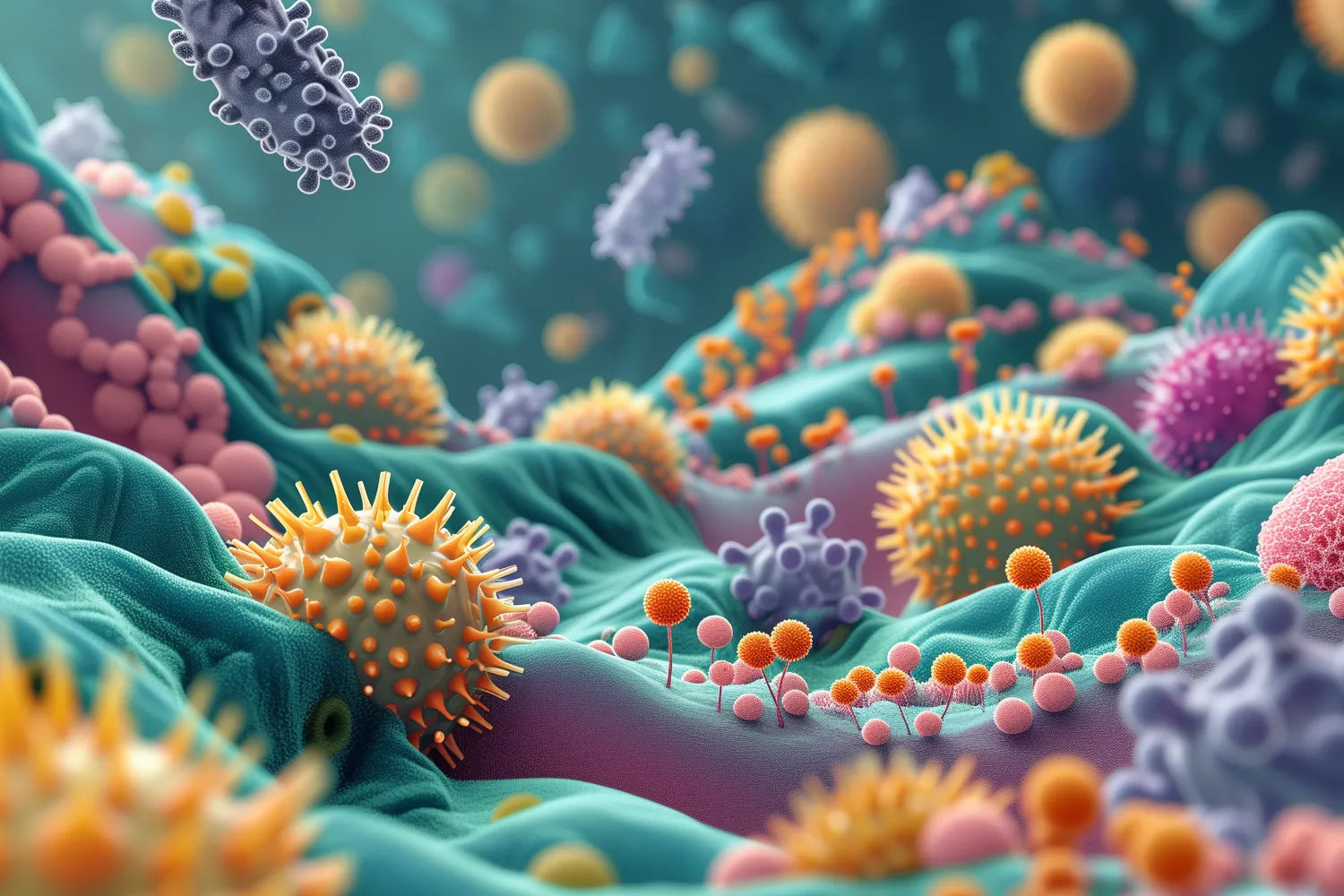
Dr. Eric Venn-Watson’s Highlights
-
- Proteins are an important part of the biochemistry of our bodies.
- Different proteins have different jobs, but all proteins make up the building blocks of virtually every process and function in our bodies.
- Taking a supplement, like fatty15, can help support your cells and ensure they’re able to create new proteins efficiently.*
Proteins comprise numerous tissues and organs in our bodies and have some pretty important jobs. If your protein knowledge is weak, get ready to muscle up. We’ll explain what proteins are and help you understand their functions.
We’ll also talk about a new way to support your body’s ability to create protein by protecting the cells synthesizing proteins.
Proteins 101
Proteins are large, complex molecules, sometimes referred to as macromolecules (aka macros), responsible for helping your body function. At the root of every function in your body is a group of specialized cells working to complete the task, and proteins are the backbone of virtually every cellular function.
Proteins are made up of amino acids. These acids bind together in long chains. There are 20 different amino acids, nine of which are considered “essential, " meaning our bodies need them to thrive but cannot readily make them on their own. That means we have to get them from our diets.
The nine essential amino acids are histidine, isoleucine, leucine, lysine, methionine, phenylalanine, threonine, tryptophan, and valine.
How Are Proteins Made?
Proteins are made from chains of amino acids that form together to create polypeptides. Polypeptides join together by forming peptide bonds. Through a complex process known as protein folding, these chains then form the specific, specialized proteins that will carry out the processes in your body.
The sequence of amino acids in a polypeptide chain determines the protein.
What Does Protein Do in the Body?
Proteins have numerous functions in our bodies, but we can categorize those functions into a few basic groups. Proteins can be antibodies, enzymes, messenger proteins, structural proteins, and transport proteins.
Antibodies
These are protective proteins that attach to viruses, bacteria, and other toxins. Antibodies are made by your immune system and help flush out these harmful compounds from your body.
Antibodies bind to antigens. These are blood proteins, sometimes referred to as immunoglobulin. They are produced by B cells (white blood cells).
Enzymes
Enzymes are the proteins inside your cells that carry out virtually all cellular processes, which occur via chemical reactions. Enzymes play a crucial role in these biochemical reactions, and are essential for digestion and metabolism.
Common enzymes used in digestion are carbohydrase (which breaks down carbohydrates), lipase (which breaks down lipids), and protease (which breaks down proteins into amino acids).
Having too much or too little of any particular enzyme can cause you to experience health problems.
Messenger Proteins
These proteins are like mail carriers, delivering messages between cells, tissues, and organs. Hormones are examples of messenger proteins. These proteins travel between receptors on cells all over the body to help the body make necessary changes and processes to maintain homeostasis.
Growth hormone is an example of a messenger protein.
Structural Proteins
These proteins make up the body’s tissues and provide structure to cells. You’re probably familiar with a few of the most popular ones: collagen and elastin.
These protein molecules are abundant in our bodies but have a reputation for their involvement in skin health. Less collagen and elastin in the skin create the appearance of fine lines and wrinkles.
Transport Proteins
These proteins help move smaller molecules across cell membranes so that they can get to other cells. Transport proteins are especially important in producing energy within a cell, the process known as the citric acid cycle or Krebs cycle. These proteins make it possible for energy creation within the mitochondria of the cell.
Some proteins can have two specific functions. Myosin, for example, is a protein found in muscle tissue with both structural and enzymatic properties.
How Much Protein Do You Need?
Now that you know what proteins do and how important they are in your body, you might ask yourself what your daily protein intake should be. Unfortunately, there’s no clear-cut answer about the amount of protein your body needs.
Although your personal trainer may suggest you consume one gram of protein for every pound of body weight to encourage muscle development and growth, there’s hardly any scientific evidence that you need this much, even when attempting to build muscle.
A better estimate for protein intake is somewhere between .64 and .82 grams per pound. This is enough protein to maintain muscle mass and build new muscle.
A high-protein diet may help keep you full, especially if you are on a weight loss plan or are involved in heavy weight-lifting or athletics, but the average person needs only about 10 to 35 percent of their calories from protein.
What About Protein Supplements?
Protein supplements, like shakes, are extremely popular, likely because they can help someone make that one gram per pound of body weight goal. However, protein supplements usually aren’t as bioavailable as getting your protein from high-protein foods.
Whole food sources of protein, like legumes and lean meats, are excellent choices for getting in large amounts of protein with each meal.
How Can You Support Your Body in Making Proteins?
Your body makes proteins inside the ribosomes of your cells. As such, it’s important to take care of your cells and ensure you eat enough high-protein food to help support protein synthesis.
In addition to eating enough protein, weight-bearing exercises can help signal your body to build more muscle, requiring more protein synthesis. However, supporting your cells to function properly and synthesize protein is incredibly important.
Thankfully, it’s really easy to do with an essential fatty acid called C15:0.
Elevate your cells. Elevate your self.
Buy NowUnderstanding C15:0
Although we have been told that all saturated fats are bad for us, science now supports that that is not the case. In fact, some saturated fats are actually essential to maintain our health!
An important class of fatty acids called odd-chain saturated fatty acids have recently been recognized. The most important of these, C15:0, has recently been identified as an essential fatty acid. Just like essential amino acids, our bodies don't make it, and we have to get it through our diets.
Science supports that higher levels of C15:0 is associated with better heart, liver, and metabolic health.* There are now calls to action to update current dietary guidelines to differentiate between good and bad saturated fats.
Further, higher levels of C15:0 has been repeatedly associated with healthy cholesterol and triglyceride levels and improved overall heart health.*
How C15:0 Was Discovered
The benefits of C15:0 weren’t initially discovered in humans. It was discovered by scientists helping dolphins live healthier, longer lives.
Once it was determined that dolphins with a higher circulating level of C15:0 were healthier, lived longer, and had fewer age-related illnesses, three years of studies showed similar benefits in humans.*
These studies were published in Nature Scientific Reports in 2020, but the research didn’t end. There are now over 50 publications from institutions such as Harvard, Johns Hopkins, Kaiser, and others supporting the health benefits of C15:0.
How Does C15:0 Help Our Cells?
How does C15:0 help our cells stay strong to carry out important functions like protein synthesis? There are three big ways:
- Cell membrane support.*Aging cells have weak, flimsy cell membranes. C15:0 is a sturdy fatty acid that integrates into cell membranes, fortifying them and keeping them strong.
- Improved mitochondrial function.* As cells get older, their battery packs (mitochondria) get sluggish. C15:0 helps recharge mitochondria, boosting their function by up to 45%.
- Better cellular signaling.*PPARs are special receptors found all over the body. These control processes like mood, appetite, sleep, and even immunity. By binding to these receptors, C15:0 helps bring regulation to these functions.
When your cells function properly, they can carry out cellular processes, like protein synthesis, better and more efficiently.*
Where Can I Get C15:0?
C15:0 is found primarily in whole-fat cows milk. However, if you simply increased your intake of full-fat dairy products, you’d consume more calories and more of the unhealthy, even-chain saturated fats.
A solution? Fatty15.
Fatty15 is the first and only supplement to contain FA15™. This pure-powder, vegan-friendly, sustainably-produced, award-winning version of C15:0 is a healthy solution for restoring your circulating levels of C15:0 and helping your cells function the way they should.*
Muscle Up!
If it’s more muscle you want, there’s more you can do besides lifting weights and choking back countless scoops of protein powder. Take care of your cells so they can make the protein you need.
Fatty15 helps your cells perform better, so your body can perform better.*
Sources:
Protein | The Nutrition Source | Harvard T.H. Chan School of Public Health
What are proteins and what do they do?: MedlinePlus Genetics.gov
Antibodies: Definition, Types & Function|My Cleveland Clinic.org

Eric Venn-Watson M.D.
CEO, Co-Founder
Senior Scientist, Co-Founder
Eric is a physician, U.S. Navy veteran, and Co-founder and COO of Seraphina Therapeutics. Eric served over 25 years as a Navy and Marine Corps physician, working with the special forces community to improve their health and fitness. Seraphina Therapeutics is a health and wellness company dedicated to advancing global health through the discovery of essential fatty acids and micronutrient therapeutics.
You May Also Like...
10 Foods Good for Your Liver: The Ultimate Guide
Your liver does a lot for you. If it had a voice of its own, it might ask you to eat more veggies and cut back on your Old Fashioneds. Unfortunately, the liver doesn’t receive a lot of attention until...
How To Improve Your Gut Microbiome: 6 Tips
Interested in how to improve your gut microbiome? We’ve got six tips to help your gut thrive and improve your overall digestion.


